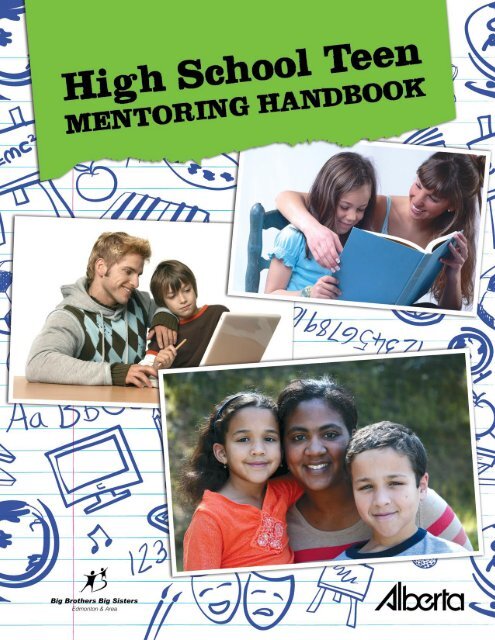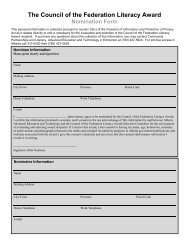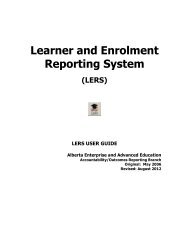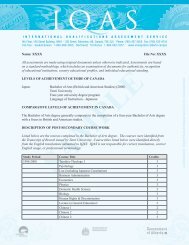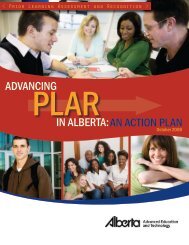High School Teen Mentoring Handbook - Enterprise and Advanced ...
High School Teen Mentoring Handbook - Enterprise and Advanced ...
High School Teen Mentoring Handbook - Enterprise and Advanced ...
- No tags were found...
You also want an ePaper? Increase the reach of your titles
YUMPU automatically turns print PDFs into web optimized ePapers that Google loves.
Characteristics of a Successful <strong>Mentoring</strong> RelationshipThe essence of a successful mentoring relationship is built on the following five characteristics:1.2.3.4.5.consistency – regular visits, showing up when saying you are going to comecloseness or connectedness – common interests or a shared bondyouth-centred – focused on the mentee’s interestsstructure <strong>and</strong> support (goals)duration – the length of time a mentoring match lasts.Benefits for <strong>High</strong> <strong>School</strong> MentorsThe <strong>High</strong> <strong>School</strong> <strong>Teen</strong> <strong>Mentoring</strong> Program is a two-for-one initiative. That is, one match between amentor <strong>and</strong> a mentee promotes the healthy development of both the elementary school‐aged student<strong>and</strong> the high school student. Over the years, research evidence has demonstrated many potentialbenefits to adolescents who participate in ongoing programs to help others.A Big Brothers Big Sisters agency partners with a local high school to recruit <strong>and</strong> select high schoolmentors like you. The agency also partners with an elementary school to identify children most inneed of mentors. They assist to create matches, <strong>and</strong> through structured sessions drive benefits such as•personal growth•academic growth•future potential.This mentoring program can open opportunities for you in community service scholarships, skilldevelopment in working with children, awareness about learning strategies, a better underst<strong>and</strong>ing ofcareer pathways <strong>and</strong> after high school education/training possibilities.<strong>Mentoring</strong> SessionsEnrolment <strong>and</strong> Training ProcessThe enrolment process for mentees includes successful completion of the following:•a referral•parent permission•child safety training.The enrolment process for mentors includes successful completion of the following:•an application•references (a parent, a teacher <strong>and</strong> a third contact), <strong>and</strong>•an interview with Child Safety training by BBBS.“…our students had an opportunity to develop positive citizenship by being involved in givingback to their community…” Elementary <strong>School</strong> TeacherAlberta <strong>Advanced</strong> Education & Technology7
Staff from Big Brothers Big Sisters Edmonton & Area will provide your mentor training. After thetraining, you’ll be matched carefully with a mentee from the partner elementary school. Thenthroughout the school year, you <strong>and</strong> your fellow high school mentors will go to the elementary schoolon a weekly basis to mentor your mentee or other meeting arrangements will be in place. You’ll alsomeet regularly with your BBBS caseworker <strong>and</strong> the other high school mentors to reflect on yourexperiences, share ideas <strong>and</strong> plan for future sessions with your mentees. That’s it in a nutshell.Objectives of the <strong>Mentoring</strong> SessionsAs a high school mentor in this initiative, you have two objectives to focus on with your mentee duringyour mentoring sessions:1.2.foster a love of reading in your menteeinform your mentee about post‐secondary schooling <strong>and</strong> career planning.This <strong>Mentoring</strong> <strong>H<strong>and</strong>book</strong> <strong>and</strong> the <strong>Mentoring</strong> Activity Book will provide you with many ideas <strong>and</strong>resources to achieve these objectives.For this to succeed, it is necessary for both mentor <strong>and</strong> mentee to form a strong relationship based onmutual caring <strong>and</strong> trust. The support you provide for your mentee aims to increase confidence <strong>and</strong>result in improved success in school. There is a section of the h<strong>and</strong>book which includes enhancing theself‐esteem of the child with whom you are working. People feel good about themselves when they aresuccessful. Organize activities so that mentees can be successful <strong>and</strong> then tell them how pleased <strong>and</strong>proud you are of them.The mentoring session will not always look the same. Some teachers will send assignments withthe child every time; some will send things occasionally. It is important to have a balance of classassignments <strong>and</strong> activities that you <strong>and</strong> your mentee have decided are important. If you think you arebeing asked to do too much homework support, be sure to discuss it with the teacher <strong>and</strong> your BBBScaseworker.Thank you for choosing to be a part of our program. Above all, enjoy your experience <strong>and</strong> have fun!What to ExpectYour First DayOn your first day, you will likely already know the school <strong>and</strong> name of your mentee. You may alreadyhave information about your mentee’s strengths <strong>and</strong> areas in which your assistance is required.Your BBBS caseworker will•meet you at the school on the first day•give you a volunteer’s name tag•show you the sign‐in binder where you write in the days <strong>and</strong> times of your visits•show you around the school so you know where you can hang your coat <strong>and</strong> where you will be ableto find the basics that you will need. (Your mentee may also show you around in further detail.)•provide you with a calendar of the school’s events for the year•take you to your student’s classroom•introduce you to the teacher when the schedule permits8 <strong>High</strong> <strong>School</strong> <strong>Teen</strong> <strong>Mentoring</strong> <strong>H<strong>and</strong>book</strong>
•introduce you to your mentee•review what is expected during the mentoring sessions•discuss the Friendship Agreement.The Friendship Agreement outlines what will happen during your visits. You, your BBBS caseworker<strong>and</strong> your mentee will all sign your names on the Friendship Agreement <strong>and</strong> talk briefly about what youmight like to do on your first day.Once everyone seems comfortable, your caseworker will leave you with your student to get started onestablishing your match.When your visit is over, you should•walk your mentee back to the classroom•remind your mentee that you will be back the following week on the same day at the same time•sign out at your designated location.If you have any questions after your first visit, be sure to speak with/call your BBBS caseworker.Throughout the YearGenerally the mentorship program starts in early October <strong>and</strong> ends the second last week of June.Each mentee visit lasts about an hour. If you have to end a session early due to your own schedule orsomething happening at the school, do not be concerned about this.You <strong>and</strong> your mentee will be given coloured transparent pouches. Yours will be full of great resourcesfor career <strong>and</strong> educational planning both for you <strong>and</strong> your parents. Your mentee will have a similarpouch including an eraser <strong>and</strong> pencil from Alberta <strong>Advanced</strong> Education <strong>and</strong> Technology. This may alsocontain a log book that will go back <strong>and</strong> forth from you to the mentee’s teacher. Your mentee may havehomework sent by the teacher that you <strong>and</strong> your mentee need to work on during your session. YourBBBS caseworker will clarify how the resources in the pouches can be used within your program.Every school has a calendar outlining the regular holidays in the year as well as any designated schooldays off. You are not required to make up days missed because of holidays or student absences.There may be times when the school has a special visitor or presentation during your scheduledtime. In these circumstances, ask mentees what they would like to do. If they choose to participate inthe school group activity, you may want to stay <strong>and</strong> join in, or you can decide to see them next weekinstead. Please realize that schools have events that come up very quickly <strong>and</strong> that participating isimportant to the children. It is not that they do not want to spend time with you.Program Evaluation<strong>Advanced</strong> Education <strong>and</strong> Technology <strong>and</strong> Big Brothers Big Sisters will use a formal evaluation processto measure the effectiveness of this program. You will find the evaluation component in the activitybook. With the results, the partners hope to develop a strategy to create sustainable mentoringprograms using high school mentors.Mid-Year <strong>and</strong> End-of-term Follow-upYour BBBS caseworker will do a mid-year follow-up with you <strong>and</strong> with your mentee to determine howthings are going. This takes place prior to January. And, your caseworker will also do a final evaluationwith you individually or with your high school group of mentors.Alberta <strong>Advanced</strong> Education & Technology9
Your caseworker will also do a final evaluation with you individually or with your group of highschool mentors:•thanking you for your participation•discuss the mentorship program <strong>and</strong> see how things went•discuss the option of returning next term or for another year.Teachers <strong>and</strong> mentees will also complete a final evaluation form to get their perspective on thementorship program.Most of the schools in our program prefer to keep the same mentor-mentee match into the next gradein order to foster the relationship that has been built. Therefore you do have the option of returning asa mentor for the same student at the same school for the next school year.Mentor NewsletterFour times throughout the year, you will receive an in‐school mentor newsletter. This newsletteroutlines upcoming events <strong>and</strong> offers ideas <strong>and</strong> suggestions for building relationships with yourmentee.Healthy Awareness in <strong>School</strong>sThere are a few simple personal health issues you need to be aware of when interacting with childrenin schools.1. During <strong>and</strong> after a visit, wash your h<strong>and</strong>s to avoid contracting germs <strong>and</strong> viruses that causecommon illnesses such as the cold or flu. Even though you are only spending time with one child,you will be exposed to many children <strong>and</strong> their illnesses in your one-hour visit. Washing yourh<strong>and</strong>s goes a long way in preventing you from becoming ill.2. Use UNIVERSAL PRECAUTIONS in h<strong>and</strong>ling blood or other body fluids. For example, if studentshave a bleeding nose, have them hold the facial tissue as a preventative measure.Your Big Brother Big Sister <strong>Mentoring</strong> CaseworkerDuring this mentoring program, you have your very own Big Brother Big Sister mentoring caseworker(BBBS caseworker). We (the caseworkers) are responsible for supervising your match <strong>and</strong> helping youmake it work. At all times, you are part of a team—you are not alone in your relationship with yourstudent. Your BBBS caseworker is present during all mentoring sessions <strong>and</strong> will always be available toassist with any questions or concerns. We want <strong>and</strong> need to know how your match is doing. Thus, weexpect you to connect with us regularly.If you see any signs in your student that make you concerned, please connect with school personnel<strong>and</strong> your caseworker immediately. It is important to talk to us about a situation so that we remaininformed <strong>and</strong> are able to assist you as well as your student.If your caseworker is not available outside of session times, please do not hesitate to speak with anothercaseworker or a supervisor atMain Edmonton Office – 424‐8181You should never feel like you are alone. You are part of the team.“… <strong>High</strong> school students really aren’t that scary.” Mentor10 <strong>High</strong> <strong>School</strong> <strong>Teen</strong> <strong>Mentoring</strong> <strong>H<strong>and</strong>book</strong>
Section 2Being a MentorBeing a high school mentor will probably be different than any experience you’ve ever had. It willbe both rewarding <strong>and</strong> challenging—rewarding because of the personal fulfillment you’ll get out ofhelping a young child <strong>and</strong> challenging because you may have to think <strong>and</strong> act differently than you’reused to.Who are <strong>High</strong> <strong>School</strong> Mentors?<strong>High</strong> school mentors are high school student volunteers trained by Big Brothers Big Sisters. What dohigh school mentors do? As a mentor, you simply become the best friend you can to your mentee. So,what does this relationship look like? Let’s take a look at how you should approach your role as a highschool mentor.Your Role as a MentorYour role as a high school mentor includes being a• good listener who will be there when needed• fun person who is a pleasure to hang out with• friend who will help inspire mentees about their future• teacher who will encourage learning• coach who will help build skills <strong>and</strong> confidence• guide who helps with setting <strong>and</strong> achieving goals• motivator who encourages others• confidant who can be trusted implicitly• role model who is admired <strong>and</strong> looked up to.What is Not Your Role as a MentorIt is also important to recognize what your role should not be. As a high school mentor, your role isNOT to be a(n)• parent figure who acts like a mom, dad, or other authority figure• therapist or counsellor who tries to analyze everything said or done• cure‐all who tries to provide solutions to every problem• missionary who promotes personal religious beliefs or values• advisor who offers advice at every step of the way.“I would love to see this program continue <strong>and</strong> flourish. It is a win/win situation for allinvolved.” Elementary <strong>School</strong> TeacherAlberta <strong>Advanced</strong> Education & Technology11
Some of these may seem a bit out of place to you. You might be thinking, “Okay. I get that being afriend to my mentee is a little different than being a friend to my high school peers. But how can I bea mentor to somebody without giving advice or trying to solve their problems?” Easy—by helping themto make their own decisions <strong>and</strong> find their own solutions. In short, by being a coach.This means your overall goal is to develop a relationship with mentees to help them•build awareness of the potential for being a healthy, happy <strong>and</strong> productive person•learn how to succeed on their own by making decisions <strong>and</strong> acting on those decisions.Take another look at the list of roles we said a high school mentor should not play. If you’re alwaysanalyzing things, offering solutions <strong>and</strong> giving advice to mentees—telling them what to do or think—it will be tough for them to develop the ability to make independent decisions <strong>and</strong> move themselves toaction; in essence succeed on their own. Try to keep coaching in mind when you’re with your mentee.This means asking or discussing with your mentee the following type of coaching questions:•Do you underst<strong>and</strong> or remember what was/is planned for today’s session?•What supplies do we need today to do the activity?•What do you need to know to do this activity?•What did you like or learn in the activity, not like?•What made you feel good about today’s session?•How can we make our sessions or activities better?•Who can we ask for help?•What would make you… feel better? …learn more? …have more fun?•What do you want to do in the next session?Responsibilities of MentorsContact With Your StudentYou are allowed to have contact with your student only in the child’s school during school hoursthroughout the school year. There is to be no exchange of addresses, phone numbers or e‐mailaddresses. This is the agreement we have made with schools <strong>and</strong> parents with regards to our program.Failure to comply with these guidelines could result in a mentor’s termination. The best response toa student who asks for any of this kind of information is to tell them that you are just an in‐schoolmentor <strong>and</strong> you can only see them at school.The <strong>High</strong> <strong>School</strong> <strong>Teen</strong> <strong>Mentoring</strong> Program may try to arrange for mentors <strong>and</strong> mentees to meet to doan activity during the summer months. The BBBS caseworker will let you know if this is a possibility.Cancelling or Missing a VisitIf you have to cancel or miss a visit, it is important for you to contact your high school teacher to informthem of your absence. The children really look forward to your visit <strong>and</strong> when mentors do not show up,especially without explanation, they are often disappointed. If you know in advance that you are goingto be away (i.e. because of holidays, tournaments, etc.), let your student know which visits you will bemissing. Also, notify your caseworker <strong>and</strong> mentee’s teacher of your away dates so that they can remindthe student that you won’t be there during those times.12 <strong>High</strong> <strong>School</strong> <strong>Teen</strong> <strong>Mentoring</strong> <strong>H<strong>and</strong>book</strong>
Consistency <strong>and</strong> ReliabilityTwo important elements in being a mentor are consistency <strong>and</strong> reliability.We ask that you be consistent with your weekly visits. Underst<strong>and</strong>ably, things will come up in your life,<strong>and</strong> you may have to miss some of your visits. But, by being consistent with your regular weekly visitswith the student, you can help alleviate disappointment.Reliability is a very important characteristic we ask of our mentors. In order to develop a meaningful<strong>and</strong> trusting relationship with your student, plus set an example for them, it is extremely importantthat you be reliable.Policy on Giving GiftsBig Brothers Big Sisters has a gift-giving policy for our mentoring program. You are under noobligation to buy a gift for your student at any time. The biggest gift you can give is you <strong>and</strong> your time.The <strong>High</strong> <strong>School</strong> <strong>Teen</strong> <strong>Mentoring</strong> Program initiative as a whole has decided that mentors are not togive gifts as most of the matches take place in groups <strong>and</strong> most students cannot afford this. The policyis set out of fairness to all children in the program, as well as to the other children in the school. Weinsist that you help us by abiding by this policy.However, we do recognize the generous nature of our volunteers. As a result, we allow our mentors togive a gift of a book or some other educational activity item such as an activity book, journal or wordgame, valued under ten dollars to their mentee at Christmas <strong>and</strong> at the end of the year.What about gifts for other holidays <strong>and</strong> birthdays? Our suggestion is that you <strong>and</strong> your mentee make acard or a gift for each other during your visit. Anything that you wish to do for the child’s class must becleared with your caseworker <strong>and</strong> the teacher beforeh<strong>and</strong>.Surprises <strong>and</strong> MythsAs your BBBS caseworker helps prepare your group for the high school mentor experience, there willmost likely be other students in your group who were mentors last year. You should ask them about allof the ins <strong>and</strong> outs of mentoring. We have provided a summary of what former high school mentorshave said about their experiences, both the pleasant surprises <strong>and</strong> the myths.Surprise #1: Kids can really amaze you.It’s true that most mentees are involved in the program because somebody thought they could use amentor, but you shouldn’t automatically think of them as “troubled kids.” They can be smart, funny,thoughtful, playful, caring <strong>and</strong> even just plain silly—they’re kids.Almost all high school mentors have discovered their mentees have many strengths <strong>and</strong> positivequalities. Learning <strong>and</strong> encouraging these positive qualities is a large part of what makes the programfun for high school mentors!Surprise #2: You <strong>and</strong> your mentee may develop a very strong emotional bond.You’ll probably find that you <strong>and</strong> your mentee have many interests in common: sports, computers, TV,music, school subjects, career options <strong>and</strong> others. In many cases, these common interests make thefriendship flourish. It’s pretty easy to develop strong connections with someone when you have thingsin common. These similarities may even help you work through the education <strong>and</strong> career planningactivities <strong>and</strong> build capacity in your mentee.Alberta <strong>Advanced</strong> Education & Technology13
Surprise #3:The bonds you develop are not just with your mentee.You <strong>and</strong> your fellow high school mentors will be meeting regularly with your BBBS caseworker to talkabout your experiences <strong>and</strong> to plan for upcoming sessions with your mentees. These meetings are agreat venue for sharing ideas, but also for getting to know each other. Many previous mentors havefound the bonds they develop with their fellow high school mentors is one of the best things about theprogram.Surprise #4: You may learn a lot about yourself.Ultimately, you <strong>and</strong> the other mentors are there to help each other be good mentors to your mentees.There’s a good chance that each of you will find that being a mentor has opened the door to newexperiences or interests for you. You may be surprised at how well you can relate to children, howcaring you are or what a great role model you can be. Perhaps it may help you determine what youwould like to do for an occupation or career path.Sound like a great program so far? Will it be a great experience for you? Yes to both. But, you have tohave realistic expectations. Don’t be surprised when you see that the realities of working with yourmentee are not always ideal. Here are some of the myths that former high school mentors have askedus to share with you.Myth #1: It will always be easy.Developing a close, positive <strong>and</strong> caring relationship with someone can be hard work. There’s agood chance that the child you’ll be matched with doesn’t have much experience with this type ofrelationship. There may even be some emotional wounds that cause them to be st<strong>and</strong>offish at first.Here are some of the common challenges high school mentors have encountered:•You cannot relate to some of the life experiences that your mentee has had.•Your mentee may not show much interest in you <strong>and</strong> your life.•Your relationship may not develop as quickly as you believed it would.•You procrastinate <strong>and</strong> wait until the last minute to plan activities.•Activities are cancelled or missed because of miscommunication between you <strong>and</strong> your mentee.•Your mentee is not sharing much about self.•Your mentee does not let you know what he or she wants to do.•Your mentee does not want to do anything you suggest.•Your mentee does not seem appreciative.•Your mentee’s social skills are not improving in spite of your efforts.In this <strong>Mentoring</strong> <strong>H<strong>and</strong>book</strong>, we offer some ideas on how to h<strong>and</strong>le situations like these. And, you’llalways have backup from your BBBS caseworker. You can turn to your caseworker for help when youneed suggestions on what to do or have concerns about your mentee. You also have a team of otherhigh school mentors to support you in your efforts.Myth #2: I will be able to see day‐to‐day changes in my mentee.With hard work, you can reasonably expect your mentee to be somewhat more confident, competent<strong>and</strong> caring at the end of the school year than at the beginning of your sessions. These changes probablywon’t be very dramatic. For example, changing from being a C student to an A student or from adepressed introvert to a self‐assured live wire is not likely. Any transformations will probably be more14 <strong>High</strong> <strong>School</strong> <strong>Teen</strong> <strong>Mentoring</strong> <strong>H<strong>and</strong>book</strong>
PhysicalCharacteristicsSocialCharacteristicsAges 5 to 7 Ages 8 to 10 Ages 11 to 13•Very active <strong>and</strong> needfrequent breaks fromtasks to do things that arefun <strong>and</strong> involve the use ofenergy•Need rest periods•Reading books togetheror doing simple artprojects are good quietactivities•Large muscles are welldeveloped; activitiesinvolving small musclesare difficult•May tend to be accidentprone•Like organized games <strong>and</strong>are very concerned aboutfollowing rules•Can be very competitive;may cheat at games•Very imaginative; involvedin fantasy play•Self‐assertive, aggressive,want to be first; lesscooperative as get older,very boastful•Learn best through activeparticipation•Very active <strong>and</strong> needfrequent breaks fromtasks to do things that arefun <strong>and</strong> involve the use ofenergy•Bone growth notcomplete yet•Early maturers may beupset with their size; alistening ear <strong>and</strong> yourexplanations may help•May tend to be accidentprone••Can be very competitiveChoosy about theirfriendsAcceptance by friendsimportantTeam games popularWorshiping heroes, TVstars <strong>and</strong> sports figures iscommon••••Small musclecoordination is good•Interest in art, crafts,models <strong>and</strong> music iscommon•Bone growth is not yetcomplete•Early maturers may beupset with their size;a listening ear <strong>and</strong>explanations will help.•Very concerned withappearances <strong>and</strong>self‐conscious aboutgrowth•Diet <strong>and</strong> sleep habits canbe bad, which may resultin low energy•Acceptance by friendsimportant•Cliques develop outsideof school•Team games popular•Romantic crushescommon•Friends set general rule ofbehaviour•Feel a need to conform(dressing <strong>and</strong> behavingalike in order to belong)•Very concerned aboutwhat others say <strong>and</strong> thinkabout them•Have a tendency tomanipulate others(“Mary’s mother says shecan go. Why can’t I?”)•Interested in earning ownmoney16 <strong>High</strong> <strong>School</strong> <strong>Teen</strong> <strong>Mentoring</strong> <strong>H<strong>and</strong>book</strong>
EmotionalCharacteristicsMentalCharacteristicsDevelopmentalTasksAges 5 to 7 Ages 8 to 10 Ages 11 to 13•Alert to feelings of others,but unaware of how theirown actions affect others•Very sensitive to praise/recognition <strong>and</strong> criticism/critique; feelings easilyhurt•Inconsistent in levelsof maturity; often lessmature at home than withoutsiders•••Very eager to learnLike to talkOwn ideas of fairnessbecome a big issueHave difficulty makingdecisions••Identification of genderdifferences•Early moral development•Concrete operations(begin to experiencepredictability of events)•Group play•Very sensitive to praise<strong>and</strong> recognition; feelingshurt easily•Because friends are soimportant; conflictsbetween adults’ rules <strong>and</strong>friends’ rules can arise••Fairness still a big issueEager to answerquestionsVery curious; arecollectors of everything(but for only short time)Want moreindependence, but knowthey need guidance <strong>and</strong>supportWide discrepancies inreading ability•••••••Social cooperationSelf‐evaluationSkill learningTeam (cooperative) play•Very sensitive to praise<strong>and</strong> recognition; feelingshurt easily•Because friends are soimportant; conflictsbetween adults’ rules <strong>and</strong>friends’ rules can arise•Caught between being achild <strong>and</strong> being an adult;often critical•Loud behaviours hide lackof self‐confidence•Look at the world moreobjectively, but look atadults more subjectively•Tend to be perfectionists(if they try to attempttoo much, they may feelfrustrated <strong>and</strong> guilty)•Want moreindependence, but knowthey need guidance <strong>and</strong>support•Attention span can belengthy••••Social cooperationSelf‐evaluationSkill learningTeam (cooperative) play“The Mentors really enjoyed the program –they rescheduled other activities to ensure thatthey could go to the elementary school as it was so much fun to be with their mentee.”<strong>High</strong> <strong>School</strong> TeacherAlberta <strong>Advanced</strong> Education & Technology17
Relationship Life CyclesJust like most relationships, a relationship with a mentee has a life cycle. Things usually start slowly<strong>and</strong> may be a little awkward; eventually interactions become easier as you become more comfortablewith each other. The following information gives you an idea of how your relationship generally mayprogress <strong>and</strong> offers some guidance on what you can do at each stage.From Hello to Goodbye1Preparing2Discovering &Negotiating3Building Rapport& Trust4Accomplishment& Attaining5Wrapping UpThe orientation, enrolment <strong>and</strong> training process.••••Learn how the program works.Learn about working with children.Bond with your fellow <strong>High</strong> <strong>School</strong> mentors.Learn about the particular child you will be matched with.The first several meetings between you <strong>and</strong> your mentor.••Find out about each other.Get an idea of your mentee’s needs <strong>and</strong> establish some overall goals ofthe relationship.The time when you both begin to invest in the relationship <strong>and</strong> build amutually satisfying relationship•Demonstrate consistancy, predictability <strong>and</strong> commitment to therelationship•Begin to allow your mentee more control of the content of yourinteractions.The time when you achieve a comfortable rhythm <strong>and</strong> feel like you arehaving some success.••Closely monitor <strong>and</strong> assess the progress of the relationshipNote how close you <strong>and</strong> your fellow <strong>High</strong> <strong>School</strong> mentors have become,<strong>and</strong> recognize group successes along the wayThe end of the year closure <strong>and</strong> celebrations (even if you plan to continuemeeting with your mentee the following school year).••Wrap things up with your mentee in a thoughtful <strong>and</strong> sensitive manner.Celebrate the fun <strong>and</strong> growth that you <strong>and</strong> your fellow <strong>High</strong> <strong>School</strong>Mentors have experienced throughout the year.“I would love to be a mentor again next year!” Mentor18 <strong>High</strong> <strong>School</strong> <strong>Teen</strong> <strong>Mentoring</strong> <strong>H<strong>and</strong>book</strong>
Tips for Stage 1: Preparing•Ask questions. It’s better to ask now than later when you are one‐on‐one with your mentee.•Think about what you are learning in the context of other relationships in your life. You may findthat lessons learned in one relationship will help you build or repair another one.•Remember that a child’s participation in the program does not mean they are a “problem child.”Mentees have a wide range of interests <strong>and</strong> needs. Teachers, counsellors <strong>and</strong> some parents requestmentors for students who they feel could use additional support.Tips for Stage 2: Discovering <strong>and</strong> Negotiating•In the first meeting, the BBBS caseworker will go through a friendship agreement with you <strong>and</strong>your mentee. This agreement will talk about the goals of your match <strong>and</strong> what strategies you willuse to achieve them.•Take the lead more in this stage than in later ones, asking more questions <strong>and</strong> planning moreactivities.•Share appropriate information about yourself.•Listen carefully to the details of your mentee’s life <strong>and</strong> family, so you can refer to these in laterconversations.•Be prepared to do more games <strong>and</strong> activities than to have in‐depth conversations as discussionswill come out of the activities.•Think about what you <strong>and</strong> your mentee want from this relationship. What is important to you?What is important to your mentee? Remember the objectives of the program.•Share successes <strong>and</strong> challenges with your BBBS caseworker <strong>and</strong> fellow high school mentors.Tips for Stage 3: Building Rapport <strong>and</strong> Trust•Be on time <strong>and</strong> do not miss sessions.•Be patient. Building trust can take a while!• Arrive knowing what activities have been planned for the session (see <strong>Mentoring</strong> Activity Book) <strong>and</strong>always ask what activities your mentor would like to do next session.•Expect some testing of limits. This is a way of determining if you will be consistent <strong>and</strong> committedeven when the mentee’s behaviour may be disappointing or difficult.•Avoid using “should” <strong>and</strong> learn alternative ways to suggest constructive behaviour; for example,ask, “How about if …?”•When talking with your mentee about post‐secondary schooling or career planning, be sure toshare your thoughts about your own plans for the future.•End each session on a positive note, finding something your mentee has done well, learned orenjoyed by completing the evaluation form together. Let them know when you will be visitingagain <strong>and</strong> plan what activities you will be doing next session.•Continue to share successes <strong>and</strong> challenges with your BBBS caseworker <strong>and</strong> fellow high schoolmentors.Alberta <strong>Advanced</strong> Education & Technology19
Tips for Stage 4: Accomplishments <strong>and</strong> Attaining•Be prepared for highs <strong>and</strong> lows. It’s possible that you’ll feel much closer to your mentee on someweeks versus others.•Do some focused thinking about how the relationship is meeting both your <strong>and</strong> your mentee’sneeds. You might ask yourself these questions:• How well do I underst<strong>and</strong> what my mentee wants <strong>and</strong> needs from me?• Have I set aside my own agenda to listen to my mentee’s concerns?• How effective is my verbal <strong>and</strong> non‐verbal communication with my mentee?• What are the strengths <strong>and</strong> weaknesses of the match between me <strong>and</strong> my mentee?• What is working best in our relationship? What is not working as well?• What things about our interactions could change to make things better?• Point out significant milestones that have been achieved <strong>and</strong> let your mentee know how excited youare about this (for example, in the areas of reading, comprehension, plans for the future, etc.).•Acknowledge the growth that you notice in the relationships among you <strong>and</strong> your fellow highschool mentors, as well as the relationships between other matches..Tips for Stage 5: Wrapping Up•Prepare mentees for the end‐of‐year closure to be sure they are not surprised by the suddenchanges.•Expect <strong>and</strong> plan to respond to feelings of anxiety or fear of separation.•Discuss with mentees what was accomplished over the course of the year. Talk about where theysee themselves going in terms of post‐secondary schooling or career paths.•Do the final evaluations <strong>and</strong> compare original answers to what you know now.•Commemorate the experience with a group celebration with the other high school mentors <strong>and</strong>their mentees.•Remember the gift-giving policy. Giving gifts may be seen as unfair by other mentees who maynot get a similar gift from their high school mentor. Instead, decide as a group on something smallthat every mentor can make <strong>and</strong> present to their mentee on certain celebrations or special holidays.•Let your BBBS caseworker know whether you plan to continue being a mentor next year <strong>and</strong>whether you plan on mentoring the same child.•Have a party just for you <strong>and</strong> your fellow high school mentors!“The return of many of last year’s high school mentors to mentor again this fall also speaks tothe benefit they feel they have not only gained but given.” Mentor20 <strong>High</strong> <strong>School</strong> <strong>Teen</strong> <strong>Mentoring</strong> <strong>H<strong>and</strong>book</strong>
Section 3Building <strong>Mentoring</strong> SkillsGood mentoring relationships do not happen by chance. They take work. The most successful highschool mentors are those who plan <strong>and</strong> prepare carefully for the relationship, incorporating tacticsthat have proven successful. You must develop <strong>and</strong> thoughtfully integrate good mentoring skills. Thissection describes those skills <strong>and</strong> helps you build them.General <strong>Mentoring</strong> Tips <strong>and</strong> StrategiesWhen asked about their teachers or mentors, students mention the following traits <strong>and</strong> behaviours asbeing important to them. These traits are also important in building the mentor‐mentee relationship.Appearance Students like to feel that adults find them so important that they are dressing up forthem. Young children especially will notice your clothes <strong>and</strong> accessories.HumourCourtesyRespectRealnessWilliam Glasser 1 says humour is a form of caring. Have fun <strong>and</strong> laugh with your student.Good manners are important for both you <strong>and</strong> your student. You can teach by example<strong>and</strong> make them feel important at the same time.Any time you encourage your student to share their ideas with you, without criticizingor putting them down, you are showing respect. Giving specific feedback also showsrespect, whether you are giving praise, correction or suggestions for improvement (forexample, “You really used some interesting descriptive words in your story,” rather than,“Good work.” OR, “I really liked your story. Can you give me more details about…?”).Let your student get to know you <strong>and</strong> you will seem more real to them, <strong>and</strong> not justanother authority figure in the school. Share stories about your own life.Not long ago, a research organization studied the relationships between mentors <strong>and</strong> mentees inBBBS mentoring programs 2 . They wanted to know what made some relationships successful <strong>and</strong>others not so successful. Basically, they discovered that the most successful relationships were those inwhich mentors took an effective approach <strong>and</strong> used effective skills. New mentors should follow theserecommendations:Be a friend.• Remember your primary role. You are there to be a friend. Don’t act like a parent. Don’t try to bean authority figure. Don’t preach about values.• Show affection, but not too much. It’s okay to let your mentee know that you have been thinkingabout them, but be careful not to smother them with hugs <strong>and</strong> other types of affection.• Show empathy. When your mentee is going through hard times, remember how it felt when youexperienced a similar problem or loss. Try to imagine how your mentee feels.1 Choice Theory: A New Psychology of Personal Freedom, 1998. The William Glasser Institute. www.wglasser.com2 Making a Difference in <strong>School</strong>s: The Big Brothers Big Sisters <strong>School</strong>-Based <strong>Mentoring</strong> Impact Study by Carla Herrera, Jean Baldwin Grossman, Tina J.Kauh, Amy F. Feldman <strong>and</strong> Jennifer McMaken with Linda Z. Jucovy, August 2007. www.ppv.orgAlberta <strong>Advanced</strong> Education & Technology21
• See your mentee as an individual. Identify what is special <strong>and</strong> unique about the child <strong>and</strong>acknowledge it.• Make frequent “deposits.” Think of building a relationship like building a bank account. Everytime you do something positive—like following through or providing encouragement—it’s likemaking a deposit that your mentee can later draw on for strength.• Remember details. Find out about <strong>and</strong> remember your mentee’s siblings, likes/dislikes, pets,classes, favourite teacher, etc.Have realistic goals <strong>and</strong> expectations.• Focus on overall development. Your primary concern should not be with making sure thatyour mentee achieves some specific outcomes (such as better grades or school attendance), butwith providing as much support <strong>and</strong> encouragement as possible to help build their capacity.Throughout the relationship, emphasize friendship over performance.• Don’t become too involved. Be aware of your mentee’s problems, but encourage them to assumeresponsibility for doing something about it (build capacity to make decisions <strong>and</strong> act). Keep inmind that some of your mentee’s problems are beyond your control. In these situations, be the bestfriend you can by listening without judgment.• Don’t take on too much. If you think that a situation has gotten out of your control talk to yourBBBS caseworker <strong>and</strong> seek help.• Don’t expect perfection in yourself or in your mentee. Human error is inevitable <strong>and</strong> won’t matteras much if your mentee knows you really care. Do your best to h<strong>and</strong>le mistakes in a responsible<strong>and</strong> constructive way. But don’t get discouraged if it seems like your mentee is uninterested in youor the program.Have fun together.• Enjoy yourself. The bottom line is that it’s not worth it if both of you aren’t having fun.• Think ahead. Focusing on “fun” games <strong>and</strong> activities early in the relationship can lead to more“serious” activities later.• Don’t worry about seeming “cool.” Find opportunities to be silly, such as making up nicknames foreach other <strong>and</strong> sharing jokes.Give your mentee voice <strong>and</strong> choice in planning activities.• Be “mentee‐centred.” Emphasize that it’s important to you that your mentee enjoy doing theactivities. Then, listen carefully to what is said.• Brainstorm together. Select the learning activities together <strong>and</strong> then brainstorm games <strong>and</strong>physical activities you would like to do when you get together. Plan a group activity <strong>and</strong> lead ittogether. Give a range of choices for possible activities.• Don’t get frustrated. Mentees may be reluctant to suggest activities because they don’t want to berude or they find it really difficult to make decisions.“Our students so look forward to the days their mentors come!”Elementary <strong>School</strong> Teacher22 <strong>High</strong> <strong>School</strong> <strong>Teen</strong> <strong>Mentoring</strong> <strong>H<strong>and</strong>book</strong>
Be positive.• Give frequent encouragement. Remind mentees of previous successes when something seemsdifficult. Tell them “you can do it.” Also discuss that when learning new things, it usually ishard the first time you do anything but that makes it challenging <strong>and</strong> worthwhile to learn. Beencouraging, even when talking about potentially troublesome topics such as grades.• Acknowledge accomplishments. In day‐to‐day activities, note when your mentee tries <strong>and</strong> succeeds(like correctly spelling a hard word or helping out a fellow classmate).• Don’t criticize the past. Avoid bringing up past mistakes.• Don’t generalize negative behaviour. Avoid phrases like “you always” or “you never.”• Don’t get discouraged. Your mentee is not going to change overnight. Be careful not to setexpectations, whether spoken or unspoken that cannot be met.Let your mentee have much of the control over what the two of you talkabout—<strong>and</strong> how you talk about it.• Explain confidentiality. Be direct in letting mentees know that they can confide in you without fearof judgment or exposure.• Don’t push. Children vary in their styles of communicating <strong>and</strong> habits of disclosure, so try to besensitive <strong>and</strong> responsive to their cues.• Be flexible. Do it their way once <strong>and</strong> your way next to demonstrate your openness to doing thingsin different ways <strong>and</strong> to respect their approach to problem‐solving. Or ask coaching questions like,“How can we…?” “What are some other ways to…?” Then, decide on a way together.• Think ahead. Remember that the activities you do together become a source of conversation.Listen.• Allow your mentee to share <strong>and</strong> vent. Just listening gives children a chance to vent <strong>and</strong> lets themknow that they can disclose personal matters to you without worrying about being criticized.• Share. While discussing any particular topic, share your personal experiences with that topic.• Use active listening. Active listening not only confirms to mentees that they have been heard, butalso acknowledges their feelings. For example, say, “You’re stuck on this question (content) <strong>and</strong>seem to be getting frustrated (feeling).”Respect the trust your mentee places in you.• Be responsible. If you are unable to make it to a mentoring session, it is best to be organized<strong>and</strong> say that in the session before. If that wasn’t possible, ask your BBBS caseworker to relay theinformation to your mentee. You might also have another high school mentor give a note from youto your mentee, letting them know you are unable to attend but still thinking of them.• If you give advice, give it sparingly. If you give advice, focus it on helping your mentee identifysolutions, not on criticizing or placing blame. Use the coaching question starters: how, what, who,where <strong>and</strong> why. “How can you react differently?” “What needs to change or be done?” “Who cansupport you?” “Where is another….?” “Why is this important to you?”Alberta <strong>Advanced</strong> Education & Technology23
• Confront thoughtfully. If you feel you have to convey concern or displeasure, do so in a waythat also conveys reassurance <strong>and</strong> acceptance. You increase your credibility if you can say whysomething is or is not appropriate <strong>and</strong> give an appropriate behaviour of statement/phrase thatis appropriate. For example, stating “when you constantly leave the table while we are doing thisactivity we will not get it done in our session <strong>and</strong> that will make us both feel sad <strong>and</strong> frustrated. Ineed you to stay here <strong>and</strong> work with me for the next 10 minutes to get this activity done”.• Respect boundaries. If you sense that a question you’ve asked is a sensitive or “touchy” subject,back off.• Don’t propose religious beliefs. It is inappropriate to encourage your mentee to adopt any religiousbelief or habit.Remember that your relationship is with the mentee, not the mentee’s parent.• Keep your primary focus on the mentee. Talk to your BBBS caseworker when you have anyquestions or concerns.• Be non‐judgmental about the family. You may learn things about your mentee’s family beliefs orbehaviours that you don’t agree with. It is not your position to cast judgment on them or on yourmentee.Remember that you are responsible for building the relationship.• Stay in touch. Take responsibility to have the best outcome for both you <strong>and</strong> your mentee inattending sessions.• Don’t expect sophisticated feedback. You will gain many things from this experience; however,detailed well‐articulated expressions of feelings from your mentee are not likely to be among them.• Be consistent. If a child has suffered many disappointments, consistency can be the mostimportant quality you can offer.• Model appropriate behaviour. Be conscious of your own behaviour <strong>and</strong> what self‐image you areprojecting verbally <strong>and</strong> non‐verbally.• Don’t share your personal problems. Only when there is a lesson to be learned by the mentee isit appropriate for you to share a personal issue. But be sure to make it clear how it relates to yourmentee’s challenges.• Don’t give medication. If your mentee needs medicine, talk to your BBBS caseworker. Never giveyour mentee any type of medication.Active Listening <strong>and</strong> Other Communication SkillsYou probably noticed that one of the mentoring tips was good listening. This is so important thatit’s worth discussing further. In order for you to be successful as a high school mentor, you have tobe a good communicator. You’ll have to learn <strong>and</strong> effectively incorporate a number of interpersonalcommunication skills.“Self confidence, social skills, self-esteem <strong>and</strong> work habits were improved <strong>and</strong> enhancedthrough mentor interaction. A quiet, thoughtful presence does much to teach social skills,etc.” Elementary <strong>School</strong> Teacher24 <strong>High</strong> <strong>School</strong> <strong>Teen</strong> <strong>Mentoring</strong> <strong>H<strong>and</strong>book</strong>
The most important of these skills is being a good active listener. Active listening is not just keepingquiet while the mentee speaks; it requires much more than that. To convey that you care <strong>and</strong> are payingattention—<strong>and</strong> to underst<strong>and</strong> <strong>and</strong> appreciate what the mentee is saying—you will need to respondin ways that help conversations go smoothly. The guidelines below provide you with some of theknowledge <strong>and</strong> skills that will help.ListenWhen I ask you to listen to me, <strong>and</strong> you start giving me advice,you have not done what I have asked.When I ask you to listen to me, <strong>and</strong> you begin to tell me why I shouldn’t feel that way,you are trampling on my feelings.When I ask you to listen to me, <strong>and</strong> you feel you have to do something to solve my problems,you have failed me, strange as that may seem.So please, just listen <strong>and</strong> hear me.And if you want to talk, wait a few minutes for your turn <strong>and</strong> I promise I’ll listen to you.Conversation BuildersAnonymousWhen you are talking with your mentee, there are many ways you can respond that will help build theconversation, making it go more easily <strong>and</strong> smoothly. These responses can be questions, statements orjust brief sounds of acknowledgement. But they are all great strategies to practise.• Making the minimal verbal response. (Provide verbal cues.) “Hm‐mm.” “Yes.” “I see.” “Uh huh.”• Paraphrasing. Mentee: “I had a bad day today.” <strong>High</strong> school mentor: “It sounds like things didn’tgo well for you today.”• Probing. “Tell me more.” “Let’s talk about that.” “Could you give me an example?” “I’m wonderingabout ….”• Reflecting. (Communicate your underst<strong>and</strong>ing of your mentee’s perspectives.) “You’re feelinguncomfortable about seeing him.” “You really don’t like being treated like a child.” “It sounds as ifyou’re really angry with your mother.” “I remember how difficult Grade 4 can be.”• Clarifying. “I’m having trouble underst<strong>and</strong>ing what you’re saying. Is it that …?” “I’m confusedabout …” “Could you go over that again, please?” “Sounds to me like you’re saying …”• Summarizing. (Recap where you left off last time, go over what you’ve done throughout the currentsession or sum up a few things that the mentee has just said.)• Informing. (Share objective <strong>and</strong> factual information such as your high school’s football record orwhat grades you will need to attend college or university.)• Reinforcing. (<strong>High</strong>light any successes.) “Congratulations for doing well on your math test!” “Wow!You learned how to ride a bike? That’s awesome!”• Self‐disclosing. “I fell down <strong>and</strong> chipped my front tooth when I was eight.” “I used to fight with mysister a lot, too.” “One of my biggest fears is talking in front of a lot of people.” “I am hoping to goto University <strong>and</strong> become a teacher.”Alberta <strong>Advanced</strong> Education & Technology25
Keep these things in mind when you incorporate these conversation builders:•Use the same vocabulary level that your mentee uses. Speak slowly enough that each word can beunderstood.•Use concise rather than rambling statements or questions. Time your responses to facilitate, notblock, communication—for example, don’t interrupt.•Minimize using closed questions to which the answer can be a simple “yes” or “no”; examples arethose that begin with “is,” “are,” “do” <strong>and</strong> “did.”•Maximize using open questions. These are questions that encourage longer answers; examples arethose that begin with “how,” “what,” “could” <strong>and</strong> “would.”•Minimize using “why” questions. These tend to put mentees on the defensive causing the menteesto think they’ve done something wrong.Conversation BlockersConversation blockers are obstacles to good conversation or good interpersonal interaction. It’s best tothink of them as “high‐risk” responses, rather than absolute killers of communication. In most cases,the occasional use of a conversation blocker will not completely destroy a relationship with a mentee.However, they are more likely to increase (at least temporarily) the emotional distance between the twoof you. Using them repeatedly can cause permanent damage to a relationship, so they should certainlybe used with caution. Below are a number of examples:• Ordering. “You must ….” “You have to …” “You will ….”• Advising. “What you should do is ….” “Why don’t you …?” “Let me suggest ….” “It would be best foryou ….” “If I were you, I’d ….”• Moralizing. (Similar to ordering <strong>and</strong> advising, but with an extra element of “duty”) “You should …,”“You ought to ….” “It is your responsibility ….” “The right thing to do is….”• Condescending. (Talking down to the mentee, such as using baby talk) “Awww, is wittle Bobbyhaving a bad day today?” “You’re too young. You wouldn’t underst<strong>and</strong>.”• Diverting. (Switching a conversation from the mentee’s concerns to your own topic) “Let’s not talkabout it now.” “Forget it.” “Think you’ve got it bad?! Let me tell you what happened to me.” “Thatreminds me ….” “We can discuss it later.”• Sarcasm. “Why don’t you burn down the place?” “Did you get up on the wrong side of the bed?”“When did they make you boss?”• Criticizing. “You’re not thinking straight.” “You’re acting like a little baby.” “Your hair is too long.”“That was dumb.” “You’ve got nobody else to blame for the mess you’re in.”• Threatening. “You had better ….” “If you don’t, then ….” “If you do this I promise I’ll ….” “Oh yeah?Try it <strong>and</strong> see what happens.”• Analyzing. (Analyzing why the mentee does or says something) “What you need is ….” “You’re justtrying to get attention ….” “You don’t really mean that.” “Your problem is ….”• Debating. (Trying to convince the mentee using facts or logic) “Do you realize ….” “Here is whyyou’re wrong ….” “Look at the facts. You broke a school rule. If you hadn’t done, that you wouldn’tbe in this trouble.”26 <strong>High</strong> <strong>School</strong> <strong>Teen</strong> <strong>Mentoring</strong> <strong>H<strong>and</strong>book</strong>
Non‐Verbal CommunicationYou’ve probably heard the saying “actions speak louder than words.” Things that are communicatedwithout words often send a stronger message than the words themselves. For example, if you were tosay to your mentee, “This is really important to me” (<strong>and</strong> then roll your eyes at the same time), is whatyou just said believable?Here are some tips on how to use non‐verbal cues <strong>and</strong> body language to optimize the conversations youhave with your mentee.After observing humans interact for as long as you’ve been alive, you probably have a pretty goodunderst<strong>and</strong>ing of the kinds of non‐verbal behaviours that would be useful <strong>and</strong> appropriate in a mentor/mentee setting. So we’re simply providing an acronym to help you remember everything you alreadyknow. Just remember to SOFTEN up!SSmileOOpenFLean ForwardTTouchEEye ContactNNodSmileOpen(Lean) ForwardTouchEye (Contact)Everybody prefers a smile over a frown. Obviously, there are times when a smile isnot the appropriate facial expression <strong>and</strong> we’re confident that you’ll know when theseare.Adopt an open posture, try not to slouch or cross your arms or legs. An open postureis a sign that you are open to your mentee <strong>and</strong> to what they have to say.During conversations with the mentee, face them squarely (not at an angle) <strong>and</strong>,as often as possible, lean slightly forward. Pay attention, however, to the distancebetween the two of you. If you sense that the mentee feels uncomfortable with yourphysical closeness, back up a bit.Appropriate touching, especially when it’s initiated by your mentee, can be agood way to show that you care. But obviously there are times when it can beinappropriate. Be sure to check with your BBBS caseworker for more information onthis.Looking someone in the eye communicates sincerity <strong>and</strong> increases your credibility.Avoiding eye contact can make you seem sneaky, guilty, bashful or frightened. Whileusing eye contact, be careful not to stare, squint or blink your eyes rapidly. It’s morenatural to look away from time to time in a relaxed, comfortable manner by justfocusing over their shoulder. Also, try to position yourself so that the two of you areat the same eye level.(Native cultures may see eye contact as aggressive behaviour. Speak to your BBBScaseworker if mentoring in a Native community.)NodUsing simple gestures like nods conveys that you’re paying attention. Otheroccasional physical gestures like motioning of the h<strong>and</strong>s, tilting your head slightlysideways <strong>and</strong> leaning in to listen closely can be helpful, too.Alberta <strong>Advanced</strong> Education & Technology27
Match ManagementYour mentee will probably show you all sorts of behaviour—from being a “model child” to being out ofcontrol. Kids seldom act the same way all the time. It’s as if they are always trying out new behaviours.Your job is to keep up with these changing behaviours <strong>and</strong> underst<strong>and</strong> the difference betweenmisbehaviour <strong>and</strong> expression of natural childishness <strong>and</strong> exuberance. But if you do find yourselfconfronted with a misbehaving child, you should be prepared to h<strong>and</strong>le it in a productive way. Bearingin mind that there are no hard <strong>and</strong> fast rules as to how <strong>and</strong> when to apply different child guidancetechniques, here’s a simple two‐step process to help you.Step 1: Look at the context or situation.Be a good detective. Take a close look at the situation <strong>and</strong> try to determine if something obvious (or notso obvious) might explain your mentee’s behaviour.WhenWhereWhatWhoIt is very common for mentees to be more excitable or restless during transition times—at thebeginning <strong>and</strong> end of the sessions.New locations tend to cause excessive loudness, shyness, etc.Lots of commotion made by nearby mentees <strong>and</strong> by other high school mentors can make itdifficult for your mentee to focus.Some children are simply more rambunctious than others by nature.Prevention Tips•Begin each session by discussing the day’s plans. Set time limits. Say that your mentee may jump,be loud or run for two minutes. Then, the two of you have to move on.•Discuss behaviour expectations before changing activities, location, etc.•When not participating in group activities, move to a place reasonably far away from the others.•Do not spend too much time on any one activity (15 to 20 minutes maximum). Variety is the key.Step 2: Practise child guidance rather than discipline.Your goal here is to guide your mentee into better behaviours rather than to “correct” or “punish”misbehaviours.• Focus on “do’s” instead of “don’t’s.” If mentees are doing something they should not be doing, statewhat they should be doing instead.• Catch your mentee behaving well. Pay attention to <strong>and</strong> praise positive behaviours. At the end of theday, say what you liked about the way they behaved.• Ignore attention‐seeking misbehaviour. Whenever possible, wait <strong>and</strong> pay more attention when yourmentee quiets down or ceases the behaviour. Say you will talk, interact or play again when yourmentee is not behaving in that particular way.“I learned how to motivate kids.” Mentor28 <strong>High</strong> <strong>School</strong> <strong>Teen</strong> <strong>Mentoring</strong> <strong>H<strong>and</strong>book</strong>
• Use positive, clear language whenever possible. Say explicitly what you would like your mentee todo <strong>and</strong> explain why you’re making this request.• Disengage from power struggles immediately. If your mentee’s behaviour is escalating ratherthan calming down the more you intervene, say that you need to take a break <strong>and</strong> removeyourself— physically if necessary—from the situation. Remember that it takes two to be in a powerstruggle—you should be the one to remove yourself from it.<strong>Mentoring</strong> ChallengesMany of our mentors find it helpful to discuss in advance some of the possible challenges they mightface during a match with a mentee. For the most part, challenges are relatively minor <strong>and</strong> can be solvedquite easily with some flexibility <strong>and</strong> creativity. The following are some situations <strong>and</strong> questions thatother mentors have brought to our attention.“What do I do if my mentee does not want to do the activities?”This is a common situation as the mentee is probably missing lunch or recess to be in the program.At first some mentees will feel unmotivated to participate <strong>and</strong> would be playing with their friends. Bypreplanning you can avoid these problems <strong>and</strong> engage your mentee early.To start, you could go for a power walk around the school <strong>and</strong> talk for about five minutes. Ask abouttheir week or the time since you last met. You might want to compromise, working on one or twoactivities <strong>and</strong> then playing a game or doing some physical activity.The session should be a 20-20-20 structure: 20 minutes of career activity, 20 minutes of literacy oracademics <strong>and</strong> 20 minutes of play. Depending on time, you may only be able to complete either a careeractivity or a literacy exercise, <strong>and</strong> use the remaining time to play a game (board or physical).Some mentors use a calendar to write out activities they will be doing each day so their mentee knowswhat to expect. Get your mentee involved in the planning to allow them to have some control over thesessions, this is a good way to engage them in decision making. If all else fails, remind your student ofthe Friendship Agreement that you both signed with your caseworker.Note: It may be that your mentee is not in the mood, may be having a bad day or not feeling well towork on an activity that day. We all have our moods where we do not want to do things, <strong>and</strong> that’sokay. This likely will not happen very often. Try your best to incorporate some other types of learningactivities.“What do I do if my mentee is having a bad day?”Everyone is entitled to having a bad day, including children. We don’t know what may have happenedat home, during recess or in the classroom. You may notice your mentee is quieter than usual orsomewhat distracted. If your mentee is feeling this way, try keeping your reading to a minimum <strong>and</strong>enjoy another activity instead. You may want to find a joke book <strong>and</strong> read it together, or tell each otheryour favourite kid’s jokes or go around the school for a walk <strong>and</strong> talk.“I have a new found respect <strong>and</strong> appreciation for what teachers have to go through.”MentorAlberta <strong>Advanced</strong> Education & Technology29
Alternatively you could ask your mentee what is wrong <strong>and</strong> talk about thinking positively. Aftertrying several techniques if your mentee’s mood doesn’t improve ask them if they would like to goback to class. Do not take it personally if the answer is “yes”, as sometimes children feel better in thefamiliarity of the classroom where they can choose to participate or not.“What if my mentee misbehaves?”It is rare that a child will misbehave during a mentoring session but it does happen sometimes. Ifmentees misbehave during a visit, consider the following:•give a warning•end the particular activity•try something new•return your mentee to the classroom if all else fails.Physical discipline is not permitted. If you are not able to de‐escalate the situation, ensure that you askschool personnel for assistance immediately. In the case of any extreme behaviour, you must discussthe appropriate intervention technique with school personnel <strong>and</strong> your BBBS caseworker.Remember that most children do some amount of testing to see what is appropriate with you <strong>and</strong> whatthey can get away with. In this situation be firm but friendly as most testing will disappear when theyclearly underst<strong>and</strong> their limits. Maintaining clear boundaries <strong>and</strong> an appropriate length of time foractivities will prevent difficult situations from arising.“My mentee is easily distracted during our visits.”Most children are easily distracted or they have a tendency to want to jump from one thing to another.This is normal. The key to h<strong>and</strong>ling this situation is to ensure that you are able to change activities atleast a couple of times during your visit. Most children have a very hard time sitting <strong>and</strong> reading a bookfor an entire hour. They need variety. You may also want to avoid high traffic areas in the school orhave students sit where facing away from hallway traffic or activity.“I need more ideas on what to do with my mentee.”Start by referring to the activities section of the Activity <strong>H<strong>and</strong>book</strong> to engage your student in activitiesrelated to career planning <strong>and</strong> post‐secondary schooling.1.2.3.4.5.Choose activities together <strong>and</strong> look for those that are more physical (build a model, move aroundthe room) or plan a group activity based on one of the group exercises.Create costumes for some of the activities <strong>and</strong> pretend to be that character.Access a computer to draw the interest of your mentee.Use your Learning Clicks CD-ROM to build an Avatar <strong>and</strong> profile for your mentee. (Extra LearningClicks CD-ROMs may be in the resource bin.)Watch some of the youth reflection videos on the Alberta Learning Information Services (ALIS)website (alis.alberta.ca/et/ep/pps/psetvideos.html).“I didn’t know I could make such a difference by doing such a simple thing.” Mentor30 <strong>High</strong> <strong>School</strong> <strong>Teen</strong> <strong>Mentoring</strong> <strong>H<strong>and</strong>book</strong>
6.7.8.9.Check the lists of literacy-based activities, website addresses for other resources <strong>and</strong> ideas of funthings to do together.Ask your BBBS caseworker what activities work well in this program.Ask your mentee’s teacher if there is anything you can help your them with.Approach your fellow mentors <strong>and</strong> find out what they do with their mentee.“What do I do if my mentee is away or absent frequently?”If your student is often absent when you come to visit, you may want to try a few things to help makeyour meetings happen:•Discuss with the teacher any reason for the absences on your visiting day. The solution may be aseasy as changing the day of your visit if this is a possibility.•Talk to the secretary about setting up a system where you call prior to coming to the school to seeif your mentee is in attendance that day. Keep in mind that school personnel will do their best tocontact you if the student is absent; however, school personnel are very busy <strong>and</strong> calling you aboutan absence may be something they miss occasionally.•Mention absences to your caseworker so that the issue can be further addressed. Most schoolsask for the mentors to call to touch base. <strong>School</strong>s will often have alternates to go in case there arechildren missing.Solutions to ChallengesThe four main points in tackling challenges that you face in your match are as follows:1. Be flexible. Be willing to change activities <strong>and</strong> realizing your mentee may be having a bad day.2. Set limits <strong>and</strong> boundaries. Remember it is okay to say, “No.” Feel free to set limits by giving yourstudent a choice, yet you control the parameters of the choices you offer.3. Ask for assistance. If in doubt in any situation, do not hesitate to speak with school personnel oryour BBBS caseworker.4. Have fun. We want your student’s experience with you to be enjoyable <strong>and</strong> fun. Your visit issomething we want them to look forward to.“I was reluctant to do mentoring at first, but very glad I did…” MentorAlberta <strong>Advanced</strong> Education & Technology31
Section 4Self‐esteem for Your MenteeBuilding Self‐EsteemSelf‐esteem is defined as self‐respect or the belief in oneself. It is how people feel about themselves. Itis the feeling of self-worth—that we can h<strong>and</strong>le our self <strong>and</strong> the environment with competence. It isthe feeling that “I am somebody.”Self‐esteem is enhanced byYou could•being in touch with yourself <strong>and</strong> your personal •share your interests, hobbies, future plans <strong>and</strong> lifehistoryconcerns•being part of a family <strong>and</strong> community •teach the value of family background <strong>and</strong> that onecan move beyond this background if needed•developing a special sense of self <strong>and</strong> recognizing •discuss how you <strong>and</strong> your student are uniqueuniquenessin appearance, talents, hobbies, career goals orinterests•having the resources, opportunities <strong>and</strong> •teach students to make decisions, set personalcapabilities to control one’s own lifelimits, take responsibility <strong>and</strong> solve problems(build capacity)• having good role models.•set an example to help students establish theirown values, goals ideals <strong>and</strong> personal st<strong>and</strong>ards.Characteristics of Individuals With <strong>High</strong> Self‐EsteemIndividuals with high self‐esteem tend to•be more effective in meeting environmental dem<strong>and</strong>s than those with low self‐esteem•adopt an active <strong>and</strong> assertive position in meeting environmental dem<strong>and</strong>s•associate with such terms as self‐respect, pride, self‐acceptance <strong>and</strong> self-love•manifest greater confidence that they will succeed•be popular with their peers•participate in more exploratory <strong>and</strong> independent activities•defend themselves well against threats <strong>and</strong> demeaning attempts by other•possess greater confidence in their ability to deal with events•have less anxiety <strong>and</strong> a greater ability to resist the negative implications of social judgments.“The high school students are building such positive relationships with our students. I know[our] kids will benefit as they learn together <strong>and</strong> strengthen their skills.”Elementary <strong>School</strong> Teacher32 <strong>High</strong> <strong>School</strong> <strong>Teen</strong> <strong>Mentoring</strong> <strong>H<strong>and</strong>book</strong>
Characteristics of Individuals With Low Self‐EsteemIndividuals with low self-esteem tend to•withdraw from others <strong>and</strong> experience constant feelings of distress•be more intro‐punitive (i.e. being hard on oneself) <strong>and</strong> passive in adapting to environmentaldem<strong>and</strong>s <strong>and</strong> pressures•feel inferior <strong>and</strong> timid•have self-hatred <strong>and</strong> lack personal acceptance•be submissive•exhibit more frequent psychosomatic symptoms <strong>and</strong> feelings of depression•isolate themselves from others. These individuals tend to feel that they have greater difficulties informing friendships than do others.•submit to social pressure•have difficulty expressing controversial opinions, even when they know they are correct; <strong>and</strong> theytend to have a strong, defensive reaction to criticism.•be “invisible members” of a group <strong>and</strong> rarely serve as leaders•be self‐conscious when talking to others. They tend to be conscious of their faults— whether realor imagined•turn inward <strong>and</strong> dwell upon themselves—unlike those with high self‐esteem.Self‐Esteem is ImportantDo the children you work with like themselves? Do they think others like them? Do they feel goodabout being them?The answers to these questions are important. A child’s self‐esteem has a tremendous influence on thechild’s educational success, behaviour <strong>and</strong> overall development.Helping Children Develop Self-EsteemAs adults, there is much that we can do—<strong>and</strong> can avoid doing—to ensure that children developconfidence <strong>and</strong> respect for themselves.We can say things such as•••“Let’s do it together.”“What do you think?”“That’s the best job you’ve done yet.”•••“We’re really proud of you.”“You’re an expert.”“Thank you.”Alberta <strong>Advanced</strong> Education & Technology33
By following these few guidelines, we can reinforce children’s positive efforts, whether in academics,in citizenship or in attitudes toward others. We will be contributing to the development of theirself‐esteem.My father knew all my faults, but to hear him talk (<strong>and</strong> in my presence, at that) you would think Ihad few equals. He showed in a hundred ways that he approved of me. When I disappointed him,he never showed anger, but instead assured me that he knew I would do better next time, that Icould do great things. Everyone should have one person somewhere in his life like me father.William JefferiesMentors’ Top 10 Ways to Build Self‐Esteem1.2.3.4.5.6.7.8.9.10.Find out what is important to mentees, including some of their favourite things.Use positive reinforcement. Point out things done well <strong>and</strong> provide compliments when appropriate.Give opportunities to succeed.Allow your mentee to make choices (i.e. choose the activity or book you will read together).Be a good role model to your mentee, who will be watching you.Remember your mentee is unique <strong>and</strong> should not be compared to other mentees.Let your mentee know when she or he has taught you something new.Be realistic with your expectations of your mentee. Set realistic goals.Allow mentees the freedom to make mistakes but also encourage them not to be defeated by thesemistakes.Smile when you come <strong>and</strong> go to show you were happy to spend time with your mentee.“This program gave Melanie some much needed one-on-one support <strong>and</strong> friendship. Sheloved this program <strong>and</strong> always looked forward to attending. It helped her with her peers <strong>and</strong>social skills. Her spirit was lifted <strong>and</strong> there was a notice in her confidence.”Elementary <strong>School</strong> Teacher34 <strong>High</strong> <strong>School</strong> <strong>Teen</strong> <strong>Mentoring</strong> <strong>H<strong>and</strong>book</strong>
Self‐Esteem EnhancementPositive ReinforcementEncouraging the DeedVerbal•I like the way you …•You’re good at …•You sure know how to …•Boy, look at all those …•I like the way you h<strong>and</strong>led that!•It looks as if you worked very hard on…That’s quite a good job.•Non‐verbalSmileWinkPat on the backNodHug•••••Encouraging Further Effort•••••••••••••That’s a difficult job …Gee! That’s tough.It sure looks like hard work.Hard, eh?That’s hard!What a job!You’ve made a good start.You’re improving.I see you’re getting ready to …You’re all set!Great! Now you’re ready to tackle …That’s a good beginning!Keep it up. You’re on the right track!Appreciation Recognition•Thanks for …•I really appreciate …•It was sure nice of you to …•I was really pleased yesterday when …•I noticed how you …•I thought it was super when you helped mewith …•Great, you did… without me even telling you.Self-Evaluation•••••You must be pleased with …That must give you a good feeling!I see you’re very pleased with …You are pretty proud of …What were some of the things you felt goodabout today?Sounds like you have some ideason how to improve in …I bet that gives you a neat feeling …Sounds like you’re excited …Sounds like you have learned …••••Adapted from: Stay in <strong>School</strong>/l’Ecole Avant Tout, Government of Canada Initiative, 1996.“I now underst<strong>and</strong> how different students are motivated by different things.”<strong>High</strong> <strong>School</strong> StudentAlberta <strong>Advanced</strong> Education & Technology35
Section 5Child Safety ProgramChild AbuseThe purpose of this section is to highlight signs <strong>and</strong> symptoms of different types of child abuse.Please note that the following signs <strong>and</strong> symptoms are not to be seen as exhaustive, but are examplesor indicators of child abuse <strong>and</strong> neglect. It is possible for a child to experience more than one form ofabuse at a time.Child abuse includes the physical, emotional or sexual mistreatment or neglect of a child by a parent,guardian or other caregiver that may result in a physical injury or emotional <strong>and</strong> psychological harmto the child. There are many different families in our community from a number of different culturalbackgrounds. Keep in mind that what has been tolerated in one country may be defined as abuse inCanada.Many children who are not abused or neglected may show one or more of these signs <strong>and</strong> symptomsfrom time to time—this does not necessarily mean that they are being abused. It is the combination,frequency <strong>and</strong> duration of indicators that should alert you to a problem. Take note of any changes inusual behaviour <strong>and</strong> extreme differences in behaviours from one session to another.Signs <strong>and</strong> Symptoms of Various Types of AbusePhysical AbusePhysical abuse is the deliberate use of force on a child’s body that may result in an injury.Physical abuse can be connected to punishment or confused with a method of discipline.Signs that a child may have experienced physical abuse include the following:•unexplained bruises, welts, lacerations or abrasions on the face, torso, back, buttocks <strong>and</strong> backs ofthe legs•unexplained small circular burns (cigarette burns) on the soles of the feet <strong>and</strong> palms of the h<strong>and</strong>s•unwillingness to tell you how an injury occurred•serious physical injuries that are left untreated•extreme behaviours (from extreme aggressiveness to extreme withdrawal)•lack of trust <strong>and</strong> fear of physical contact with adults•unwillingness to have you talk to his or her teacher about an injury•having parents who give an unlikely explanation for an injury or who blame it on another person•wearing clothes that cover arms <strong>and</strong> legs, even in hot weather; child resists changing clothing forany reason.36 <strong>High</strong> <strong>School</strong> <strong>Teen</strong> <strong>Mentoring</strong> <strong>H<strong>and</strong>book</strong>
NeglectNeglect consists of omission on the part of the parents or caregiver to provide thebasic necessities to a child. Examples of this include: lack of sufficient food, clothing,shelter, adequate medical care or adequate supervision to prevent injury. Neglect may beidentified by looking at the overall emotional <strong>and</strong> physical well-being of a child.Signs that a child may have experienced neglect include the following:•appears hungry, listless <strong>and</strong> tired, has poor personal hygiene <strong>and</strong> frequently unattended physicalor medical needs (hair, teeth, eyes <strong>and</strong> ears).•gets inadequate supervision or childcare arrangements (places the child at risk) or is left at homewithout any supervision•frequently misses school•has parent(s) or guardian(s) who miss appointments <strong>and</strong> do not follow through on school requests,or easily allow others to assume this responsibility•craves physical contact with others•“fails to thrive” despite lack of disease or abnormality.EmotionalAbuseEmotional abuse is the persistent attack on a child’s sense of self. Examples includehumiliation, isolation, rejection, intimidation <strong>and</strong> name‐calling. Emotional abuse destroysa child’s self‐image. A child who has been emotionally abused will often say “I can’t” <strong>and</strong>gets overly upset if they make a mistake. The child may be afraid of new situations <strong>and</strong>changes <strong>and</strong> may have the inability to trust others.NOTE: Some of these signs may also be an indication of another kind of upset in a child’s life such assome type of loss (death of pet, death or illness in family, break‐up of family members).Signs that a child may have experienced emotional abuse include the following:•acts older or younger than appropriate stage of development•displays a range of behaviours from aggressiveness <strong>and</strong> being out of control to being withdrawn<strong>and</strong> depressed•states they are being blamed or belittled on a regular basis by parent(s) or guardian(s)•seeks constant approval <strong>and</strong> has an unusual need to please adults•feels responsible for parent’s difficulties <strong>and</strong>/or disappointments•arrives early for school <strong>and</strong> makes excuses why they can’t go home•has unusual fear of consequences of actions—often leads to lying.Alberta <strong>Advanced</strong> Education & Technology37
Sexual AbuseSexual abuse includes any sexual exploitation of a child, whether or not it is consented to.It includes behaviour of a sexual nature towards a child by another child or adult. Sexualabuse is often difficult to identify because the children are often abused by a parent,relative or trusted adult‐figure in the child’s life who has threatened the child “not to tell”<strong>and</strong> to “keep the secret.”Signs that a child may have experienced sexual abuse include the following:•complains of pain or itching in the genital area•has detailed knowledge of sexual behaviour inappropriate for the child’s age•exhibits sexually precocious behaviour, or, creates artwork involving sexually explicit body parts orsexually abusive details•dresses inappropriately (wears clothing that covers their arms <strong>and</strong> legs even in hot weather orwears provocative clothing)•receives unexplained gifts or money•seems sad or unhappy, <strong>and</strong> has poor self‐esteem•runs away from home often or talks about wanting to run away•is discouraged from having contact with others <strong>and</strong> has poor peer relationships•is reluctant to go to a particular place or be with a particular person.How a Volunteer Should Talk With a Child WhoDiscloses AbuseAbuse victims are scared. They are scared of the past, the present <strong>and</strong> the future. They feel helpless<strong>and</strong> vulnerable <strong>and</strong> have a tremendous need for safety. The overriding thought that remains is, “Willtelling be worse than not telling?”The following are important points to remember about h<strong>and</strong>ling a disclosure of abuse:Do•••••Believe the child.Stay calm.Listen openly.Reassure child it is not his/her fault.Reassure child he/she did the right thing bytelling.Let the child know what you are going to do.Offer the child comfort <strong>and</strong> support.Tell the child’s teacher, school principal orcounsellor before leaving the school. Then,inform your BBBS caseworker.•••Don’t•Display indifference or trivialize the abuse.•Display shock, horror, panic or disapproval to thesituation.•Interrupt while the child is telling the story.•Allow the child to feel “in trouble” or “at fault.”•Expect the child to disclose everything at thebeginning.•Make an inappropriate promise not to tell anyone.•Press or probe for information or counsel thechild.•Confrontthe alleged offender.38 <strong>High</strong> <strong>School</strong> <strong>Teen</strong> <strong>Mentoring</strong> <strong>H<strong>and</strong>book</strong>
Procedures for Reporting Child AbuseIt is essential that you report any suspicion of abuse as soon as it is identified. This is importantparticularly where there is concrete physical evidence on the child (bruises, burns, welts, brokenbones). Some forms of physical evidence that may disappear within 24 hours are needed to corroboratethe child’s complaint. You do not have to prove that abuse has taken place as long as you havereasonable <strong>and</strong> probable grounds for the suspicions <strong>and</strong> are reporting your observations based on yourwork with the child.As an in‐school mentor, you should report any suspicions or disclosures directly to the appropriateschool personnel, specifically the child’s teacher, school counsellor, principal or vice‐principal.DO NOT LEAVE THE SCHOOL WITHOUT SPEAKING WITH SCHOOL PERSONNEL FIRST.As an in‐school mentor, you are required to connect with your BBBS caseworker immediately afterspeaking with school personnel.There will always be a Big Brother Big Sister caseworker present in the school during your sessions.The school will deal with the abuse disclosure. They may want to speak with the child directly <strong>and</strong>any siblings in the school before calling Children’s Services <strong>and</strong>/or police to gather as much necessaryinformation as possible.Each disclosure is dealt with on an individual basis. The responsibility for investigation <strong>and</strong> follow‐uplies with Children’s Services <strong>and</strong>/or police. Cases will be prioritized <strong>and</strong> responded to by Children’sServices <strong>and</strong>/or police depending on the urgent nature of the report.After making your verbal report to the school <strong>and</strong> caseworker, you may want to jot down some notes:the date <strong>and</strong> place of your conversation with the child is important, <strong>and</strong> details on what the child hasreported using the actual words the child used.Above Suspicion: Protecting Yourself as a VolunteerAs more cases of sexual abuse are revealed through the media, there are bound to be situations wherethere is doubt about the guilt of the accused. Sometimes allegations made by children are actually“unfounded” <strong>and</strong> the accused is acquitted because of insufficient evidence. But, we are left to wonderwhether or not the individual was really “guilty”.The justice system is improving <strong>and</strong>, in general, the rights of the victims are becoming more evenlybalanced with the rights of the accused. Nevertheless, the system is not perfect <strong>and</strong> the media isquick to make a case of unfair treatment when a career is tarnished or a reputation is damaged. As aresult, some people are urging those who care for children not to show any kind of physical affectionwhatsoever.This kind of instruction is an overreaction—part of the backlash against the new measures for workingagainst child abuse. It is important to show caring <strong>and</strong> to encourage children by being warm <strong>and</strong>affectionate. An extra effort by a child deserves a friendly “pat on the back” or a “tousling of the hair” tolet them know how proud you are of them.Alberta <strong>Advanced</strong> Education & Technology39
There are sensible ways for volunteers to continue to show warmth to children while protecting theirown integrity. The following are guidelines you should follow to protect yourself as a volunteer:•Make a point of showing affection to your mentee in open places where others can see <strong>and</strong> share inthe warmth. If you are comfortable with others watching what you are doing with children, you areprobably okay.• Touch children ONLY on safe places on their bodies: the back, the head <strong>and</strong> the shoulders areacceptable. Avoid private places; they are not acceptable: the buttocks, breasts, thighs or groin.•If a child is experiencing pain or feeling ill, take them to the school office. If an examination isnecessary, it can be conducted by school personnel.•If a child is sad <strong>and</strong> needs to be comforted, show affection by placing your arm around a shoulder<strong>and</strong> give a gentle hug or a good squeeze from the side. There is no need to hold or cuddle thechild—leave this to the parent(s) or guardian(s).•When conducting visits with your mentee, ensure you are in a designated or approved area of theschool, in view of others.•Sexually explicit conversations are not appropriate. If children ask any questions about sexuality,it can be h<strong>and</strong>led by informing them that this is not a question for you, but rather a question fortheir parent/guardian. You should inform the teacher <strong>and</strong> the caseworker about the situation.Always respect the integrity of the mentee you are matched with.Your mentee’s wishes must always be respected <strong>and</strong> a volunteer is never to stray beyond the “comfortzone” of the mentee. Be alert to your mentee’s messages about their own personal space <strong>and</strong> the extentto which they are comfortable, if at all, with your physical closeness. For some children, even thebriefest <strong>and</strong> least intrusive physical contact is not comfortable. It is not part of your job to “adjust” theircomfort zone. Accept them the way they are <strong>and</strong> adjust your own behaviour accordingly.Always think about propriety before you act. As with physical safety, we want you to keep both thereality <strong>and</strong> the perception of your behaviour beyond reproach. What may have been perfectly innocent<strong>and</strong> well intentioned on your part may look completely different to someone else. Don’t allow yourselfto stray into, or to be drawn into, a compromising situation that could be misinterpreted.No secrets ever!We teach the children that there shouldn’t be any conversations or actions between the mentors <strong>and</strong>mentees that cannot be shared with their guardian, teacher <strong>and</strong> caseworker.These recommendations are made for your protection, not to frighten or discourage you fromdeveloping a close relationship with your mentee. Relax, have fun <strong>and</strong> be comfortable knowing you areenriching a child’s life.40 <strong>High</strong> <strong>School</strong> <strong>Teen</strong> <strong>Mentoring</strong> <strong>H<strong>and</strong>book</strong>
Section 6Underst<strong>and</strong>ing LearningLearning StylesTo contact a person by phone, you must dial specific numbers in the proper sequence. Our mind worksin much the same fashion as a telephone switching system. It goes through several operations in aspecific order, which allows it to store or retrieve information. We all do this a little bit differently. Eventhough we use our five senses to learn about the world around us, we develop our own unique learningstyle.Most of us learn new things by predominantly using one preferred learning style:•auditory•visual•kinesthetic/tactile.The Auditory learner prefers to “hear” about new things; the Visual learner would sooner see ademonstration or read instructions; <strong>and</strong> the Kinesthetic/Tactile learner, learns best by doing thingsthat are physical in nature or that have some emotional feeling attached to them. Some of us combinetwo or three modes when learning. Or, depending on what we are learning, we may switch ourpreference from one mode to another.If we use all three modes, we tend to learn things better. However, there is no right or wrong way oflearning. Most people just use or adapt their own unique combination of learning modes.You can improve your ability to learn simply by underst<strong>and</strong>ing your dominant learning style (or styles)<strong>and</strong> by using the following chart. On the next page is a test designed to help you underst<strong>and</strong> yourlearning preferences. Please take as much time as you require; answer the questions honestly as thereis no right or wrong answer.When you have answered all the questions, please add up your scores. The area that has the highestscore indicates your preferred learning mode; your lowest score indicates your least preferred <strong>and</strong> leastused mode of learning. By using some of the ideas listed under your strongest mode from the chartbelow, you can enhance your learning of new material.This activity will help you determine your best learning style. Underst<strong>and</strong>ing how you learn helps youto be a better student.When you have finished, transfer each number to its proper place on the Scoring chart on page 43.Then, add up each of the three columns on that page. You will then see very quickly your best learningstyle. At that point, you will know whether you are a visual, auditory, or kinesthetic/tactile learner.By this we mean whether you, as an individual, learn best through seeing things, hearing things ortouching things.“My Mentor helped me with my school work <strong>and</strong> it’s been improving because of her. I wantto be a mentor when I am older!” MenteeAlberta <strong>Advanced</strong> Education & Technology41
Place a check in the appropriate column after each statement.Often Sometimes Seldom1. I remember more about a subject by listening to my teacherthan by reading about it.2. I follow written directions better than spoken directions.3. I like to write things down or take notes for visual review.4. I press down very hard with a pen or pencil when I write orprint.5. I require explanations of diagrams, graphs or visual directions.6. I enjoy working with tools.7. I am skilful with <strong>and</strong> enjoy developing <strong>and</strong> making graphs <strong>and</strong>charts.8. I can tell if sounds match when presented with pairs ofsounds.9. I remember best by writing things down several times.10. I can underst<strong>and</strong> <strong>and</strong> follow directions on maps.11. I do better at academic subjects by listening to discussions<strong>and</strong> tapes.12. I play with coins or keys.13. I learn how to spell by repeating the letters out loud ratherthan writing the word on paper.14. I can better underst<strong>and</strong> a news article by reading it than bylistening to the radio.15. I chew gum, or snack while I study.16. I remember best when I picture something in my head.17. I learn spelling by “finger spelling” or writing out the words.18. I would rather listen to a talk or speech than read about thesame material in a textbook.19. I am good at solving jigsaw puzzles <strong>and</strong> mazes.20. I grip objects in my h<strong>and</strong>s when I am studying or listening tothe teacher.21. I prefer listening to the news on the radio to reading about it ina newspaper.22. I obtain information on an interesting subject by readingrelevant materials.23. I feel very comfortable touching others, hugging, shakingh<strong>and</strong>s, etc.24. I follow spoken directions better than written ones.Adapted from the Barsch Learning Style Inventory, Academic Therapy Publications.42 <strong>High</strong> <strong>School</strong> <strong>Teen</strong> <strong>Mentoring</strong> <strong>H<strong>and</strong>book</strong>
Scoring ChartOften = 5 pointsSometimes = 3 pointsSeldom = 1 pointPlace the point value on the line next to its corresponding item number. Then add the numbers toobtain the preference scores under each heading.VISUAL AUDITORY TACTILE (Kinesthetic)No. Points No. Points No. Points2 1 43 5 67 8 910 11 1214 13 1516 18 1720 21 1922 24 23VPS = APS = TPS =VPS = Visual Preference ScoreAPS = Auditory Preference ScoreTPS = Tactile Preference ScoreMy learning style is ___________________________________________________________ .I Iearn best by _______________________________________________________________ .My least preferred style of learning is _ ___________________________________________ .I hear <strong>and</strong> I forget.I see <strong>and</strong> I remember.I do <strong>and</strong> I underst<strong>and</strong>.Chinese proverbAlberta <strong>Advanced</strong> Education & Technology43
Activities That Accommodate Specific Learning StylesVisual LearnerIf you are a visual learner, you will remember things best when you’ve seen them.•You will like a stimulating <strong>and</strong> orderly environment.•You probably like to use diagrams <strong>and</strong> charts.•You probably like reading, <strong>and</strong> may be a good speller.Study tips to help visual learners•Write things out to help you learn them.•Draw pictures, charts <strong>and</strong> maps to help you underst<strong>and</strong> things.•Use mind mapping.•Use planners, organizers or goal-setting charts.•<strong>High</strong>light important points with colour.•Try visualizing ideas <strong>and</strong> facts in your mind.•Try changing places in the room while you’re studying, to get a different perspective.•Use models if they’re available.•Have a clear view of your teachers when they are speaking so you can see their body language <strong>and</strong>facial expressions.•Study in a quiet place away from verbal disturbances.Auditory LearnerIf you are an auditory learner, you will learn best when you’re listening (for example, when a teacheris speaking or when you are talking to someone). You will remember things best when you’ve heardthem.Study tips to help auditory learners•Talk things through as you learn them, with a friend or tutorial group.•Get a friend to read aloud to you.•When you have to learn facts, try reciting them to yourself, or even singing them aloud.•Find out if you study best in silence, or with music playing in the background.•Participate in class discussions or debates.•Use a tape recorder in class instead of taking notes.•Speak out loud to someone while they write down your thoughts.44 <strong>High</strong> <strong>School</strong> <strong>Teen</strong> <strong>Mentoring</strong> <strong>H<strong>and</strong>book</strong>
Tactile/Kinesthetic LearnerIf you are a tactile/kinesthetic learner, you will learn best when you’re moving around. You willremember things best when you’ve done them. You may have trouble with spelling. In lectures, youmay make many notes but tend never to look at them again.Study tips to help tactile/kinesthetic learners•Move around as you learn <strong>and</strong> revise.•Work in a st<strong>and</strong>ing position.•Work through problems physically (by doing the problems or sample problems).•Mentally review what you’ve been studying while you’re swimming or jogging.•Use models <strong>and</strong> machines when you can.•Take plenty of breaks while you’re studying.•Chew gum while studying.•Use bright colours to highlight reading material.•Dress up your room with posters.•Listen to music as you study.•Skim through reading material to get a rough idea what it is about before settling down to read itin detail.Language DevelopmentLanguage development is a process that takes many years. Infants learn to respond to the languagethey hear in their homes by developing a listening vocabulary. As children grow, they start to uselanguage to communicate, at first with words only their mothers can underst<strong>and</strong>. This is the beginningof a speaking vocabulary. The development of oral language is the foundation of literacy learning.Children who have not been raised in a language-rich environment will encounter difficulties in theirattempts to read. It is very important to remember that talking with your mentee, reciting nurseryrhymes, telling stories, jokes, riddles <strong>and</strong> playing word games will help them become a competentreader.Most children first encounter books when someone reads to them. In order for them to underst<strong>and</strong>stories, they must have an underst<strong>and</strong>ing of the vocabulary used <strong>and</strong> the concepts presented. Alwaystalk about the ideas <strong>and</strong> the words before, during <strong>and</strong> after reading a book. Exposure to good children’sliterature helps mentees learn about the world <strong>and</strong> their place in it.Alberta <strong>Advanced</strong> Education & Technology45
The literacy skills of reading <strong>and</strong> writing develop together. We often say that children “learn toread with a pencil” since decoding (sounding out words) <strong>and</strong> encoding (spelling) are really oppositeprocesses using the same knowledge of the sound‐symbol relationship of the English alphabetic code.Therefore, each session should reinforce both reading <strong>and</strong> writing. Remember that stories are not theonly print material to which children need to be exposed. The career activities, non‐fiction books,magazines, newspapers <strong>and</strong> all sorts of pamphlets can also be read <strong>and</strong> enjoyed. In some schools,access to computers will allow you <strong>and</strong> your student to access <strong>and</strong> enjoy career activities <strong>and</strong> otherinformation online.The use of language for listening, speaking, reading <strong>and</strong> writing, like any other skill, will improve withpractice. The more you can incorporate language learning in sessions with your student the better.Paired ReadingYour goal is to make literacy fun, <strong>and</strong> to have the mentee see reading as enjoyable. Don’t let a childstruggle with any reading or writing task. When encountering an unfamiliar word, let your mentee tryto sound it out if desired, but quickly intervene <strong>and</strong> supply the word if your mentee is not successful.Another option is paired reading, reading out loud together (paired). Pace your reading speed to theirs<strong>and</strong> have your mentee track the lines you are reading with a ruler. Slow down if they fall behind <strong>and</strong>point to the word you are at to begin again if they completely stop reading. It takes practice to do pairedreading but is a great way to increase literacy.Using a dictionary is a difficult task for a child to master; if the meaning of a word is unknown, tellyour mentee what it means. When your mentee is working on a written assignment, offer to do thetyping, writing or printing. If your mentee is doing the writing, you can help by spelling the wordswhen needed.Reading AloudMost of us enjoy having someone read to us <strong>and</strong> children are no exception, even those in Grade 6. Readwith expression in your voice <strong>and</strong> ask probing questions at the end. When you read to your mentee,you provide access to books that may be beyond their reading ability but feature concepts they can stillunderst<strong>and</strong>.“This is a wonderful program. The kids that are chosen are always excited <strong>and</strong> willing toparticipate.” Elementary <strong>School</strong> Teacher46 <strong>High</strong> <strong>School</strong> <strong>Teen</strong> <strong>Mentoring</strong> <strong>H<strong>and</strong>book</strong>
This <strong>High</strong> <strong>School</strong> <strong>Teen</strong> <strong>Mentoring</strong> <strong>H<strong>and</strong>book</strong>will provide you with valuable information onhow to be a mentor, including:•building a great mentoring relationship•surprises <strong>and</strong> myths about mentoring•developing your conversation <strong>and</strong> listening skills•determining your learning styles•protecting your mentee


